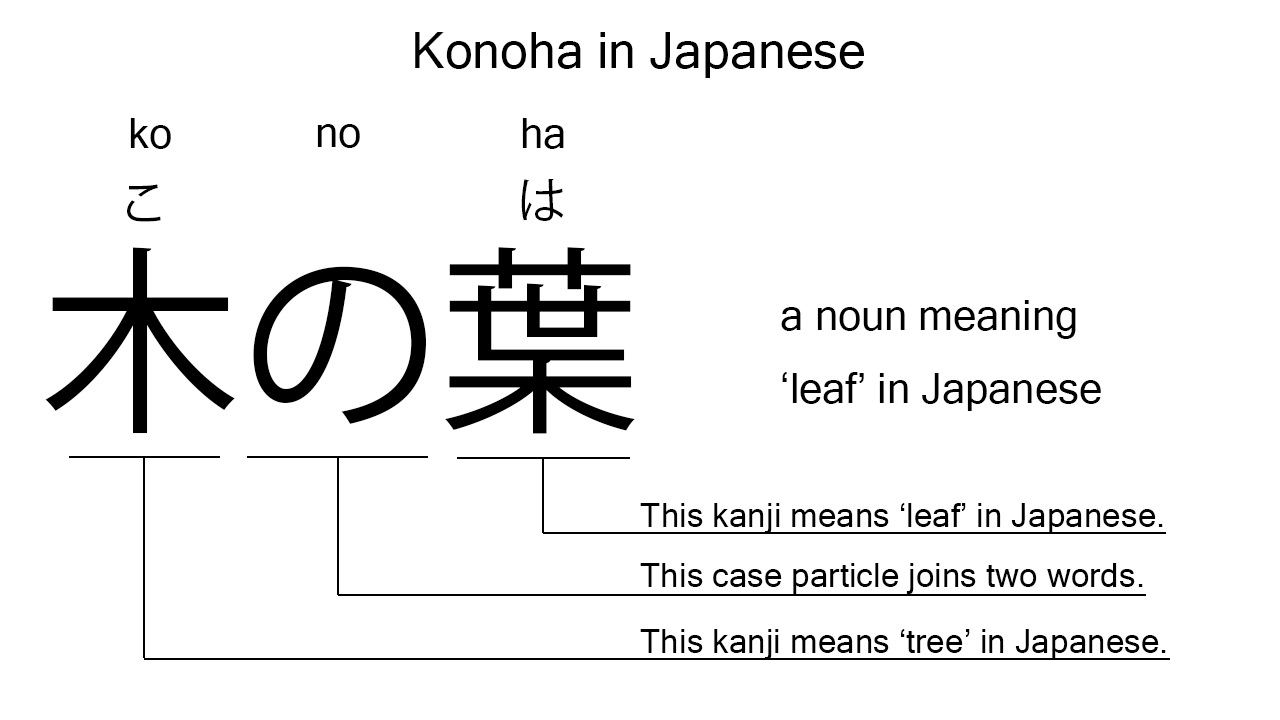What does “konoha” mean in Japanese?
Native speakers use konoha often to mean a ‘leaf’ in Japanese. Perhaps, some Japanese learners know this word as it is sometimes used in Japanese movies, songs, novels, manga, anime, and the like. In this blog post, however, I’m explaining this word in detail based on its kanji mixed expression. And also, I’m explaining how to use it through example sentences. My explanations would help Japanese learners understand konoha more clearly. Then, let’s get started!
Contents
Definition and meanings of “konoha”
Let me start with the definition and meanings of konoha.
- konoha – 木の葉 (このは) : a noun meaning a ‘leaf’ or specifically ‘winter leaf’ in Japanese. This can also work as plural. Learn more about Japanese plural.
The definition and meanings are simple and clear. To understand this noun more clearly, however, let me explain its kanji mixed expression in detail.
Konoha in kanji
The kanji mixed expression of konoha consists of the following three characters:
- ko – 木 (こ) : a noun meaning a ‘tree’ in Japanese. This can also work as plural.
- no – の : a case particle used to join two nouns. Normally, the first one can work as a modifier to describe the second. Word orders in Japanese and English are different, but the role of this case particle is similar to that of the English preposition, of.
- ha – 葉 (は) : a noun meaning a ‘leaf’ in Japanese. This can also work as plural.
From these three characters, we can understand that the formed noun literally means ‘leaves of trees’ in Japanese. This literal interpretation is very close to the actual meanings.

When we meet new kanji expressions, we should check their kanji characters in detail to understand their meanings clearly and deeply. In many cases, kanji characters tell us a lot about the meanings of the expressions they form. Actually, here, we could get the better understanding of konoha through the detailed check above.
So far, I’ve explained the definition and meanings of konoha together with its characters. Then, let me explain how to use it through the example sentences below.
How to say “leaf” in Japanese
konoha ga ochi ta – 木の葉が落ちた (このはがおちた)
A leaf fell.
Below are the new words used in the example sentence.
- ga – が : a case particle used to make the subject word or the object word in a sentence. In the example, this is used after konoha to make the subject in the sentence.
- ochi – 落ち (おち) : one conjugation of the verb, ochiru, which means ‘to fall’ in Japanese. In the example, it has been conjugated for the better connection with its following word.
- ta – た : an auxiliary verb used after a verb, adjective, or auxiliary verb to make its past tense form. Probably, this is well known as a part of Japanese ta form. In the example, this is used after ochi to make its past tense form, ochi ta.
This is a typical usage of konoha. In this example, it works together with the case particle, ga, to become the subject in the sentence. When we want to mean a ‘leaf’ in Japanese, anyway, this noun is a very good option.
Another example of “konoha”
akai konoha wa totemo kirei desu – 赤い木の葉はとても綺麗です (あかいこのははとてもきれいです)
Red leaves are very beautiful.
Below are the new words used in the example sentence.
- akai – 赤い (あかい) : an i-adjective meaning ‘red’ in Japanese.
- wa – は : a binding particle working as a case marker or topic marker. In the example, this works after akai konoha to make the subject in the sentence.
- totemo – とても : an adverb of degree meaning ‘very’, ‘much’, ‘so’, or such in Japanese. In the example, this works in front of kirei to emphasize its meaning.
- kirei – 綺麗 (きれい) : the stem part of the na-adjective, kireina, which means ‘beautiful’ in Japanese.
- desu – です : an auxiliary verb used after a noun or adjective to make it polite. Probably, this is well known as a part of Japanese desu form. In the example, this is used after kirei to make it sound polite.
This is another example of konoha. In the example, it works together with the i-adjective, akai, to mean ‘red leaves’ in Japanese.
Summary
In this blog post, I’ve explained the definition and meanings of konoha in detail based on its kanji mixed expression. And also, I’ve explained how to use it through the example sentences. Let me summarize them as follows.
- konoha – 木の葉 (このは) : a noun meaning a ‘leaf’ or specifically ‘winter leaf’ in Japanese. This can also work as plural. These three characters literally mean ‘leaves of trees’ in Japanese. This literal interpretation is very close to the actual meanings.
Hope my explanations are understandable and helpful for Japanese learners.
Leave a Reply